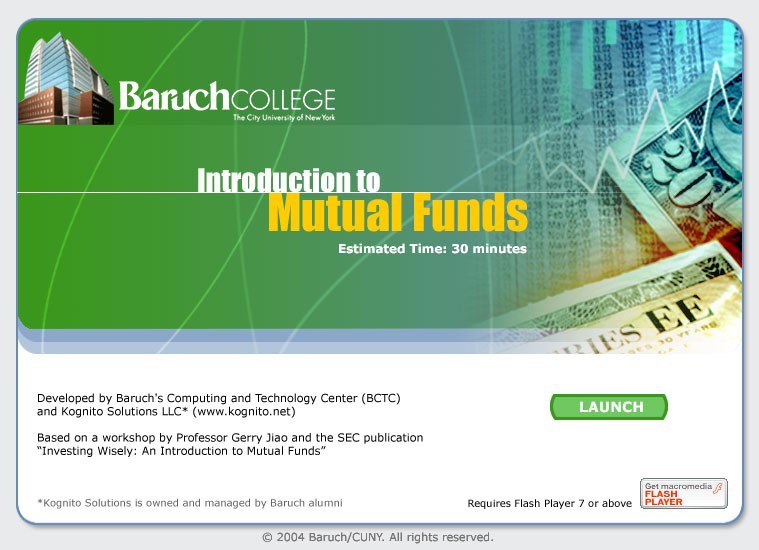An Introduction to Mutual Funds
Post on: 11 Апрель, 2015 No Comment

Published on October 2nd, 2006
The GRS discussion forums have become spam magnets. They werent used much anyhow, so Im taking them down. (To be replaced by something better in the future.) I dont want to lose any of the contributions from readers, though, so Ill move the best posts to this blog over the next few weeks. This first post is an introduction to mutual funds from VinTek original thread here .
This is a very basic introduction to mutual funds.
Stocks and Mutual Funds
In the beginning, there were stocks, and that was good. You could invest in companies that you believed would prosper, and you could prosper with them. The trouble was, if you made a bad choice, you’d get hammered. That’s life. You have to take the bad with the good.
Then came mutual funds, and that was better. Now you could reduce the risk of getting saddled with a loser by buying a basket of stocks. You were likely to have losers, but there would also be winners. Your risk was tempered by the diversity of the stocks you held. And to help you through it all, you had a fund manager who would use your money to buy the stocks he thought would do well, and sell the stocks he thought would do poorly. Of course, he didn’t work for free. He’d take a percentage of your money every year (say 2%, more or less) as his fee for picking stocks. But if he wasn’t good at what he did, you might wind up with more losers than winners. Another hammering. Maybe years of hammering, if the manager was a doofus.
Index Funds
Then came index funds, which were hailed as the ultimate in investing. You’d invest not in just a basket of stocks, but in the entire market. Since the manager wasn’t required to do research and pick stocks (all he had to do was buy it all and hold it), his fee was reduced to a fraction of an actively managed fund’s fees (about 0.2%). Yes, you could have years of losses (2000, 2001 and 2002 were the most recent), but studies show that the market always recovered, even if some of the companies in the index didn’t. If you wanted put your investing on autopilot and be assured of a long-term (any 20 year period since the 1920s had an average gain of 10% per year) winner, this was the way to go.
Do I own index funds? You bet! I think they’re an essential part of any portfolio. Are they the only funds I own? Nope. I think that if you work hard, it’s possible to find winners. Of course, there are a lot of people smarter than me who disagree. But it’s my money, and if I want to gamble on some some funds that I think will perform better, then that’s where I’ll put my money. But note that most of the money in these funds is money I can afford to lose if I pick a bad fund. Some of these funds do much better than the index; some of them do much worse. Overall, I’m doing well, but to be honest I’m not sure if I’m good or just lucky.
The Big Three
There are four big mutual fund families, but Im eliminating American Funds from this discussion because theyre sold by brokers and are thus load funds. I cant see paying $50 out of every $1000 you put into their funds. Do their funds perform well? Yes, theres no denying that some of their funds have terrific performance. But there are no-load funds that perform just as well, so why pay the load?
I call these fund families the Big Three not only because theyre enormous, but also because they have a variety of funds that cover every investment style and segment you could wish for. The Big Three are:
If youre just starting out, you should probably pick one family and stay with it. Youll be able to track all your investments more easily in one place.
The Big Three cover it all: index funds, managed funds, large-cap, small-cap, mid-cap, value, growth, blend, sector funds, international, emerging markets, etc. With any of these guys, you should be able to find the fund(s) that will suit your targets for growth and fit your tolerance for risk. As you get more savvy, you can expand beyond one family into the others, or even to fund companies outside of the Big Three. Some people do just that, attempting to fine-tune their portfolios to their liking. Others never leave the fund family they start with, content in the variety it already offers.
Go to the web site of any one of the Big Three and there are not only funds to look over, but also a wealth of investment advice.
Conclusion
If you have any questions, feel free to comment here. In the meantime, here are some good articles about mutual funds:
Ill post more from the forums here in the future, including more from Vintek on Index Funds.
GRS is committed to helping our readers save and achieve their financial goals. Savings interest rates may be low, but that is all the more reason to shop for the best rate. Find the highest savings interest rates and CD rates from Synchrony Bank. Ally Bank. GE Capital Bank. and more.














